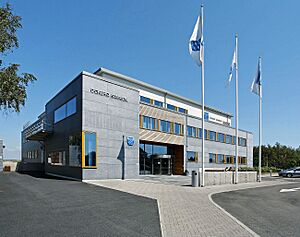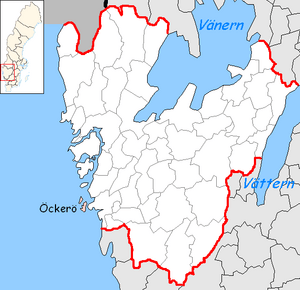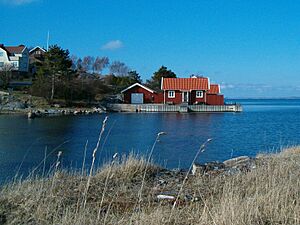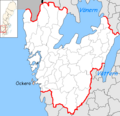Öckerö Municipality facts for kids
Quick facts for kids
Öckerö Municipality
Öckerö kommun
|
||
|---|---|---|

Öckerö town hall
|
||
|
||
 |
||
| Country | Sweden | |
| County | Västra Götaland County | |
| Seat | Öckerö | |
| Area | ||
| • Total | 516.4 km2 (199.4 sq mi) | |
| • Land | 25.91 km2 (10.00 sq mi) | |
| • Water | 490.49 km2 (189.38 sq mi) | |
| Area as of January 1, 2010. | ||
| Population
(June 30, 2012)
|
||
| • Total | 12,350 | |
| • Density | 23.916/km2 (61.941/sq mi) | |
| Time zone | UTC+1 (CET) | |
| • Summer (DST) | UTC+2 (CEST) | |
| ISO 3166 code | SE | |
| Province | Bohuslän | |
| Municipal code | 1407 | |
| Website | www.ockero.se | |
Öckerö Municipality is a special area in western Sweden. It's like a small local government that manages a group of islands. The main town, called Öckerö, is on the biggest island, also named Öckerö.
This municipality is made up of many islands located just outside the big city of Gothenburg. It's part of the Northern Gothenburg Archipelago. It's quite small, covering only about 26 square kilometers, making it one of the tiniest municipalities in Sweden.
Öckerö Municipality is special because it hasn't changed its size much since it was first created way back in 1862. This is rare in Sweden, as most other municipalities have joined together over time.
Contents
Geography: Islands and Connections
The municipality includes ten islands where people live all year round. These islands stretch from the Vinga Lighthouse up to the town of Marstrand. The ten islands are:
The word "ö" means "island" in Swedish. So, names like Björkö mean "Birch Island."
Hönö is the largest island, with about 4,800 people living there. Öckerö island is also quite big, with around 3,100 residents. All ten islands have people living on them throughout the year.
Most of the islands are connected to each other by bridges. However, there are no roads that connect the islands to the mainland. You can only reach them by car ferries from western Gothenburg. The ferries run often, making it easy to travel. In 2003, people in Öckerö Municipality voted against building a bridge to the mainland.
People and Population
In 2022, Öckerö Municipality had 12,895 residents. Most of these people were Swedish citizens old enough to vote. The community is made up of people with different backgrounds. Most residents were born in Sweden with Swedish parents. A smaller number of people have family heritage from other countries.
History: From Vikings to Fishing
Early Times: Viking Age and Norwegian Rule
During the Viking Age, the islands of Öckerö were controlled by the Norwegian kings. This part of the coast was known as Älvsyssel. In the 1200s, King Hakon Hakonarson often visited the area with his navy. He even built a house on Öckerö island.
Becoming Part of Sweden
Around 1658, the Öckerö islands became part of Sweden. This happened when the region of Bohuslän joined Sweden.
The Herring Boom
In the mid-1700s, fishing for herring became a huge industry. The fishing communities on the islands grew and became very successful for about 50 years. This time was very important for the islands' economy.
Symbols and Language
In the 1950s, the municipality got its own coat of arms. Since fishing has always been the main activity, the coat of arms shows a boat and ten herrings. The ten herrings represent the ten inhabited islands.
The people on the Öckerö islands speak a special Swedish Götamål dialect called Ömål, or öbo. It sounds a bit like the Swedish spoken in Gothenburg, but it also has some words and features that come from English.
Images for kids
See also
 In Spanish: Municipio de Öckerö para niños
In Spanish: Municipio de Öckerö para niños
 | Janet Taylor Pickett |
 | Synthia Saint James |
 | Howardena Pindell |
 | Faith Ringgold |






